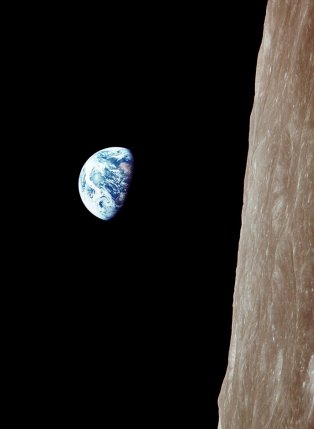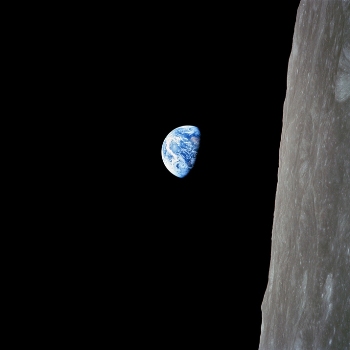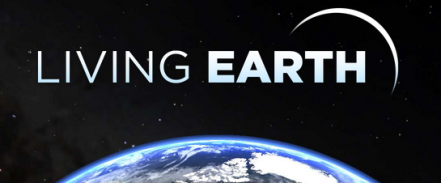File:Earthrise, the way Anders saw it.jpg
Earthrise,_the_way_Anders_saw_it.jpg (314 × 429 pixels, file size: 12 KB, MIME type: image/jpeg)
Whole Earth Awareness
"Earthrise": Historic First-ever Vision of Our Home Planet
The Apollo moon program -- and one Apollo photograph transcends all others, an image so powerful and eloquent that even today it ranks as one of the most important photographs taken by anyone ever.
Although the photograph is usually mounted with the moon below the earth, this is how Astronaut Anders saw Earth rising.
The Earthrise photo taken by Apollo 8 astronaut, William A. Anders
- Earth Comes Into View as Never Before Seen
- December 24, 1968
Apollo 8 was the mission which put humans into lunar orbit for the very first time.
Until then, no human eyes had seen the far side of the Moon - (all previous images of the far side of the moon had come from robot spacecraft).
Virtually all of the photographs scheduled for the Apollo 8 mission were to do with capturing high resolution images of the lunar surface - both of the far side and of potential landing sites on the near side.
The 'Earthrise' photograph was not on the mission schedule and was taken in a moment of pure serendipity.
In order to take photographs of the far side of the moon the Apollo spacecraft had been rolled so that its windows pointed towards the lunar surface. During this time, the Moon was between the spacecraft and Earth, effectively cutting-off all radio communication with mission control. As Apollo 8 emerged from the far side on its fourth orbit, crew commander Frank Borman rolled the spacecraft so as to position its antennas for radio contact with mission control. Looking to the lunar horizon for reference he exclaimed - "Oh my God, look at that picture over there! Here's the Earth coming up!"
The famous photograph that was taken in the next two minutes is usually credited to crewman William Anders, although commander Frank Borman has always claimed that he took it.
It turns out that in fact three photographs were taken, one in black and white and two in colour. The black and white shot was taken first - by Borman, and the two colour shots were taken moments later by William Anders.
The curious thing about the images is the difference in the way the two men perceived what they were seeing. Frank Borman related the 'Earthrise' to a moonrise on Earth, with the lunar surface horizontal and the Earth rising above it.
William Anders framed his photographs from the perspective of being in orbit about the lunar equator. So his horizon was the plane in which he was travelling. This meant he framed it so the edge of the Moon was vertical, with planet Earth a little to the left but with its North and South poles aligned the same way as the North and South poles of the Moon.
(It is interesting to note that the colour photographs taken by William Anders are almost always re-published with the image on its side - ie from the perspective that Borman adopted for his B&W photograph).
But regardless of which way the photograph was taken, the image shows our entire world as a small and blue and very finite globe, with our nearest celestial neighbour a desolate presence in the foreground.
US Nature photographer Galen Rowell has described this image as "the most influential environmental photograph ever taken".
It is an image which still speaks to us today.
GreenPolicy siterunner: And speaks to us everyday as Planet Citizens responsible for protecting life on Earth.
- ·················································································································
PlanetaryAwareness.org -- https://www.greenpolicy360.net/w/Category:Earth_Observations
Earth, in Living Color -- https://www.greenpolicy360.net/w/Earthrise
File history
Click on a date/time to view the file as it appeared at that time.
| Date/Time | Thumbnail | Dimensions | User | Comment | |
|---|---|---|---|---|---|
| current | 15:05, 22 April 2017 |  | 314 × 429 (12 KB) | Siterunner (talk | contribs) |
You cannot overwrite this file.
File usage
The following 22 pages use this file:
- @Earth360
- Apollo 8
- BigPicture Media
- Earth Day Memories on the 50th Anniversary
- Earth and Space, Politics
- Earthrise
- Environmental movement
- GreenPolicy360-eOS
- Green Quotes
- Green Stories of the Day
- Green Stories of the Day - GreenPolicy360 Archive
- Overview Effect
- PlanetCitizen
- File:Apollo.jpg
- File:Apollo 8, Life Jan10,1969.png
- File:Apollo Earth 350x350.jpg
- File:Earth Day memories.png
- File:Earthrise images - vertical orig - and horizontal.png
- File:Where is global warming.jpg
- Category:EOS eco Operating System
- Category:Eco-Quotes
- Category:Whole Earth
- Atmospheric Science
- Climate Change
- Earth
- Earth360
- EarthPOV
- Earth Day
- Earth Observations
- Earth Science
- Eco-Spirituality
- Environmental Security
- Global Security
- NASA
- Orbital Perspective
- Overview Effect
- Planet Citizen
- Planet Citizens
- Planetary Science
- Space Science and Space Physics
- Strategic Demands
- ThinBlueLayer
- Whole Earth
- Youth



